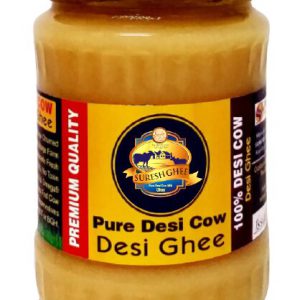Desi cow ghee is one of the healthy foods that our mom, grandmother or aunt expects us to eat during pregnancy. Desi cow ghee, which is the Indian name for clarified butter, is an excellent source of fat and is often included in the diet of a pregnant woman.
But how much ghee is safe during pregnancy? Here, we will discuss if you can eat ghee when you are pregnant, how much you can eat and how to consume it to avoid excess fat.
Is the consumption of desi ghee during pregnancy third trimester necessary?
As we all know diet plays a very important role in pregnancy. An expectant mother needs to eat a well-balanced diet to supply nutritional food to her growing fetus. It’s said that ghee helps in lubricating the vagina for normal delivery, also believed that it eases labor pain and stimulates contractions.
For a growing fetus, a pregnant woman requires only 350 extra calories to cater the nutritional food to the baby. For adding extra calories you’ll be able to add ghee to your diet with many benefits.
Ghee isn’t only a household staple but also an important part of Indian food. Desi ghee has been linked with a lot of health benefits. A2 ghee is enriched with Omega-3 fatty acids, Omega-9 fatty acids, vitamins, minerals, and antioxidants.
You’ll be able to consume desi ghee within all trimesters. Indian culture is believed to benefit from eating ghee for a pregnant woman in the following ways:
- Provide relief from constipation during pregnancy.
- Help within the development of the baby’s brain.
- Helps in the nourishment of the baby.
- Helps in the digestion of food.
- Provide ease with labor.
Myths related to consumption of desi ghee during pregnancy
Many myths are related to the consumption of ghee during pregnancy. Many folks suggest that you don’t add ghee to your diet simply because you prefer the taste. If you want to feature it in pregnancy, you’ll be able to have it after the consultation with the doctor.
But drinking milk with ghee added extra nutrition and calories to pregnant women and their unborn children. Many folks believe that including ghee in your diet in nine-month helps in normal delivery.
Few questions arise while we think of including desi ghee in your diet during pregnancy:
- Is it safe to eat ghee during pregnancy?
- Can you eat ghee during early pregnancy?
- How about ghee consumption during the third trimester?
- What are the benefits of ghee during pregnancy?
- What are the side effects of consuming ghee during pregnancy?
- How much ghee can you take during pregnancy?
- Common myths associated with ghee consumption during pregnancy
- How can you include ghee in your pregnancy diet?
- What is the importance of ghee in Ayurveda during pregnancy?

Buy cow Ghee Online: Order Now. Free Shipping
A2 desi ghee is a lactose and casein-free dairy product, which is easy to digest and boosts metabolism. Since it is a healthy source of fat and is often used to replace butter and oil in the diet. However, it is suggestible that you must consult your doctor to include too much ghee in your diet during pregnancy.

The benefits of eating desi ghee during pregnancy include many things which few are – treating digestive issues, aiding baby development, nurtures the body of the mother.
Ghee can be used raw or as an ingredient in cooking. You may use ghee as toppings on rice, parathas, rotis, khichari etc. You may mix the same with vegetables or dal. You can use ghee in preparing desserts such as kheer, ladoos etc. You can also include ghee with milk.
Ayurveda prescribes the consumption of pure cow ghee by adding it to boiled milk along with saffron (1 to 2 drops), honey (3 to 4 drops) and a little bit of turmeric. This beverage is believed to boost the immunity, and brain health of the baby and promote safe delivery.
Ghee is known to hold many health benefits, so moderate consumption of this fat should be okay. Swapping your cooking oil with ghee (preferably homemade) could be a healthy option. But if you are in a dilemma, seek medical advice.

Is It Safe To Eat Ghee During Pregnancy?
Yes, it is safe to eat a moderate amount of ghee every day when you are pregnant. Unlike other dairy products, ghee is easier to digest and boosts metabolism.
Since it is a healthy source of fat, ghee is often used as a substitute for butter and oil. However, check with your doctor before adding too much ghee to your diet.
How About Consuming Ghee During Pregnancy Third Trimester?
When ghee is consumed in the third trimester, it can irritate the bowel to extend the contractions to the uterus and induce labor. Ghee is also believed to lubricate the vagina, thereby aiding smooth delivery. However, neither of these claims is backed by scientific evidence, they are common myths associated with ghee.
Can You Eat Ghee During Early Pregnancy?
Yes. You can eat ghee throughout your pregnancy, right from the early stages till the end. But if weight is a concern, you should be cautious about its consumption in the first semester.
How About Ghee Consumption During Third Trimester?
When ghee is consumed in the third trimester, it can irritate the bowel to extend the contractions to the uterus and induce labor. Ghee is also believed to lubricate the vagina, thereby aiding smooth delivery. However, neither of these claims is backed by scientific evidence, they are common myths associated with ghee.

Benefits of Desi Ghee during Pregnancy:
Ghee is rich in Omega 3 fatty acids, Omega 9 fatty acids, vitamins, minerals and antioxidants. Ghee has many health benefits but its benefits in pregnancy are not scientifically proven. However, in Indian culture ghee is believed to have the following benefits in pregnancy:
- It helps in relieving constipation in pregnancy
- It helps in the development of baby’s brain
- It helps in easing labour
- It helps in improving the digestion
- It helps in nourishing the baby
There are many ways Ghee can be induced to diet:
- Ghee can be used as toppings on Rotis, parantas.
- Can use used in khichari, vegetable, and pulao
- Can be used in the preparation of Ladoos, kheer, halwa.
- Ghee can be taken with milk as well. However, it is less advisable in pregnancy
Why Consuming Ghee in Pregnancy Might Not Be Safe?
Consuming ghee in pregnancy does not have any ill effects on the health of the mother or her unborn child. You may include ghee in your diet during pregnancy as it is a good source of fats.
However, it is important to include a moderate amount of ghee in your diet, as consuming large amounts of ghee could lead to weight gain and obesity. Physical activity also reduces in the last months of pregnancy and more amount of ghee could make you and your baby gain more weight.
Normal or vaginal delivery can become difficult in case your baby gains more weight. Adding ghee to your diet may also lead to excess weight gain in case you are already consuming a high caloric diet or consuming junk food often. Excess weight and obesity may cause complications in your pregnancy and it may become very difficult to get rid of excess fat after childbirth.
Are There Any Negative Impacts or Issues?
It is an all-clear statement that Ghee intake poses hazards only when the intake is substantially increased. Total avoidance of Ghee, hence, is to be based on a recommendation from your Obstetrician’s / Nutritionist’s desk.
Please do remember that the intake of Ghee can help you look younger and act smarter, but cannot decide your mode of delivery- whether it would be normal or caesarean. Hence, just eat it with respect, in a way.
What Are The Side-Effects Of Consuming Ghee During Pregnancy?
Ghee does not have any side effects if consumed in moderation. Moreover, it is a source of good fat. But, consuming higher amounts of ghee can:
- Make you and your baby gain excess weight. Reduced physical activity in the last weeks of pregnancy, compounded with excess ghee consumption, could make normal delivery difficult.
- Lead to obesity if you are already on a high calorific diet or consume junk food often.
- Can make it difficult to shed away the excess weight after childbirth.
To avoid the above complications, seek your doctor’s advice before adding ghee to your pregnancy diet.
FAQ
Indeed, intake of a minimal quantity of ghee daily is considered safe during pregnancy. Ghee significantly sticks out from other dairy products due to its effortless digestion and metabolism-enhancing properties. Although, for people who are overweight or obese, tracking the consumption of ghee is advisable.
Ghee, being a rich source of essential fats, is most often utilized as an alternative for butter and oil. Despite its benefits, it’s pivotal to implement moderate consumption and resist excessive incorporation into your meal.
During the time period of pregnancy, it is generally suggested to incorporate around two to three teaspoons of ghee. The medical suggestions for regular fat intake is approximately six teaspoons, with 10 to 12% of saturated fats, such as those found in ghee.
Ghee can be safely incorporated in your meal throughout all stages of pregnancy, incorporating from the early phases. Although, individuals careful of their weight should be mindful about the amount of ghee intake during this period.







 WhatsApp us
WhatsApp us
Naveen m...